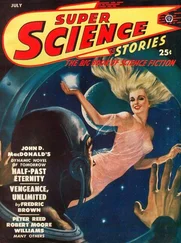“Who did it?”
“Two horrible men. Bobby came over on Saturday night. Saturday was his birthday. I made my famous paella in the big casuela I brought from Spain. You can’t get all the right ingredients here, but it was really very good. And we had quite a lot of Spanish wine. Yesterday morning, just before noon, we were lounging around the house, listening to music, and those men rang the doorbell and came muscling their way right in, grinning and laughing at us and talking dirty. They had this battered little tape recorder, and they set it up and made us listen to some of it. I don’t care what kind of a relationship you have, Jimmy, a recording of completely personal things sounds vulgar and nasty and horrible. Bobby got quite hysterical and went positively flying at them to turn it off, but they slammed him back against the wall and he hurt his head. I was going to punish them, but one of them took a gun out. Have you ever seen anybody aiming a gun at you in your own living room? It is really impossibly theatrical. It’s truly vulgar. That put Bobby in even worse condition, and I had to quiet him down. Then they told me I was resigning immediately and we were leaving town. No place for us in a decent community and so on. Just what you’d expect. If we didn’t leave, the recording would be played for some of the members of my board, and I’d be publicly accused of being a deviate at the public hearing on Wednesday, and their evidence would be turned over to the police. You see, there’s nothing I can do except what I’m doing, Jimmy. All we can do is run. If we stay here and brazen it out, not only will it be hurting a lot of people I’m fond of, but we could really be sent to prison. The laws down here are truly medieval.”
“What were the men like?”
“Oh, rather beefy fellows in their thirties, ignorant types, with meaty faces, dressed in cheap resort clothes. I’ve never seen them before. Their first names were Ray and Andy. They acted like cops. They had a southern accent, and a lot of dirty language, and they acted like it was all very very funny. They hadn’t done anything very tricky. They’d just fastened a microphone onto my window sill with a long wire running all the way to the driveway next door, where they sat in their car and listened and ran the tape recorder whenever they felt like it. They were in a dark green De Soto with Tampa plates. The house next door is empty for the summer. One of them must have sneaked over and put the microphone where he wanted it as soon as it got dark.”
“Where are you going?”
“I made some phone calls yesterday afternoon. We’re going to borrow a friend’s cottage on Fire Island and spend some time forgetting there is such a place as Palm County. Then I’ll find something in New York. Jimmy, I know I’m imposing on you, but would you please tell Tom Jennings? I know I should phone him. I just can’t.”
“I’ll tell him.”
Mortie Dermond walked into the lobby with Wing. “Say goodbye to the others, the few who mean anything to me. Jackie, Kat, you know the ones. Explain it a little, so I won’t look too bad.”
“Sure, Mortie.”
There were several huge raw-looking canvases hung in the lobby, predominantly black, red and white. The blacks were weighty and structural, like Kline. They were by a local young man named Sol Utica.
Morton Dermond stopped by the largest painting. “Poor little Sol. He’s derivative, of course. But he’s finding where he wants to go, and he’ll have to have time. They’ll find somebody for my job who won’t give Sol gallery room. They’ll pack this place with the hobby people, beach scenes, waving palms, picturesque fishing nets. I can feel wistful about that, Jimmy.”
“People like to object to what they don’t understand, Mortie.”
“It’s more than that. There’s something we can’t say to the public because it sounds so arrogant it makes people screamingly angry. Work like this is like mirrors. Cruel mirrors. They can’t reflect a substance which doesn’t exist. A person who is nothing will look at these and see nothing. They’ll be baffled, angry, indignant. They’ll think they’re being had. They say a child could have done it, or a monkey. They’ll think the whole world of modern art is some vast conspiracy. We tell them to make an effort to understand. That’s nonsense, actually. They can’t suddenly become actual people through an effort of will. This is a world they can’t enter, so they claim it doesn’t really exist. But it is more real than anything they can ever know. Dear God, if a man looks at a meadow and sees only a drainage problem, or something he thinks he can kill, why should he think he should be able to look at a painting? That’s what angers them, Jimmy. They sense their limitations, and defend themselves by accusing the rest of us of fraud.” He smiled. “My final lecture as director, my friend. I guess you are a reasonably sensitive man, but I shouldn’t expect too much empathy from you.”
“What do you mean?”
“You’re adequately tolerant, I suppose. But the prejudice is still there, isn’t it? ‘Some of my best friends are a little queer. Some of them are real nice guys.’ But I disgust you a little, don’t I?”
“What’s the point of talking like this, Mortie?”
“Turning the knife in the self-inflicted wound. Or maybe it’s luxurious self-expression, my friend. Once you’ve burned a bridge, you can turn and yell anything you want. You see, you dreadfully viable types have a conviction of righteousness and decency which offends me. So the prejudice, like all prejudice in the world, works both ways.”
“Is this doing any good?”
“It probably isn’t even very good therapy, dear man. Out of pure reaction, I’ll probably get progressively queeny as time goes by. Goodbye, Jimmy, and thanks for some small favors. No, I’d rather not shake hands, because at the moment it strikes me as a sort of gesture of tolerance.”
Jimmy shrugged and walked out. Mortie’s new red Falcon station wagon was parked near the entrance, down on its haunches with the weight of the luggage inside and on the roof rack. Bobby Serba was checking and tightening the lines which held the tarp. He was a willowy man, with an abundance of glossy dark hair and a minimum of chin. He gave Jimmy a slow glance as Jimmy walked by. He had long almond eyes, and in the glance was that same wary, remote, inhuman speculation he had seen in the eyes of penned cattle.
It was a little after six o’clock when he parked at Elmo’s office. Elmo’s pickup and Sandra Straplin’s little car were there. The street door was locked. He pressed the bell but could not hear it ring because of the traffic sounds behind him. He alternately hammered on the door and pressed the bell button. After a long time he saw Sandra walking toward him, her heavy breasts bouncing, her eyes narrow, her mouth ugly with annoyance.
She unlocked the door and swung it open and said, “When you phoned, Jimmy, I told you he was too busy to see you. What’s the matter with you anyhow?”
“I want to see him for a minute.”
“Come on. You’ll see him, all right. You got him in a dandy mood now.”
Elmo was standing beside his desk. He dropped the papers he was looking at and stared at Jimmy as he came in. Muscles bulged and flexed along the hard angle of the jaw.
“Get out and shut the door, Sandra.” As soon as the door closed he said, “You getting uppity, boy. You want to talk to me, you phone. She told you tomorrow. Not tonight. Tomorrow.”
“Don’t I have special privileges? As a member of the team?”
“You say that pretty snotty. Who all the hell you think you’re getting to be?”
Jimmy went over and sat on the couch and looked at him. “I’m good old Jimmy Wing. That’s all. I do odd jobs. Like at the Drowsy Lady Motor House. Like carting Buck’s wench to Tampa. Like sidelining Doris Rowell. Like telling you every move old Tom Jennings plans before he makes it. When we get to Tallahassee, Elmo, will I have my own office? And a state car? I worry about things like that.”
Читать дальше
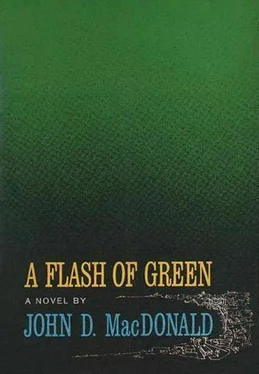
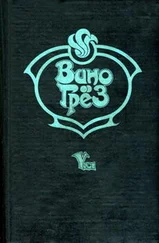
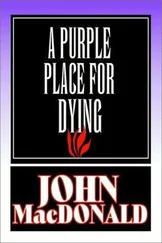

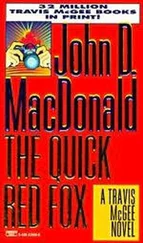
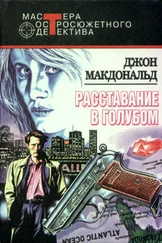

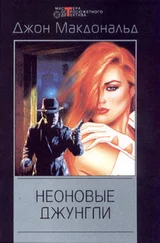


![Джон Макдональд - Wine of the Dreamers [= Planet of the Dreamers]](/books/430039/dzhon-makdonald-wine-of-the-dreamers-planet-of-thumb.webp)

